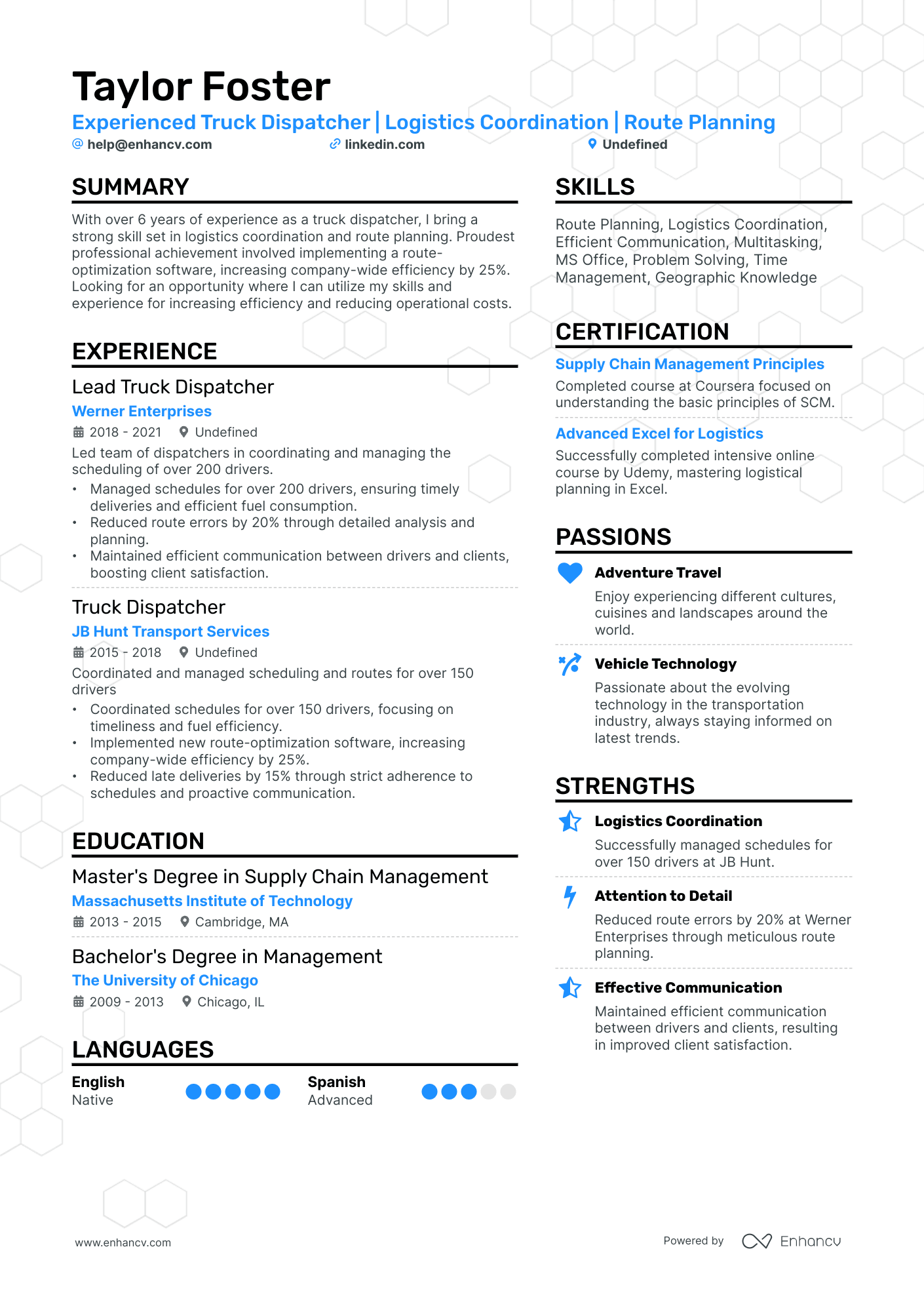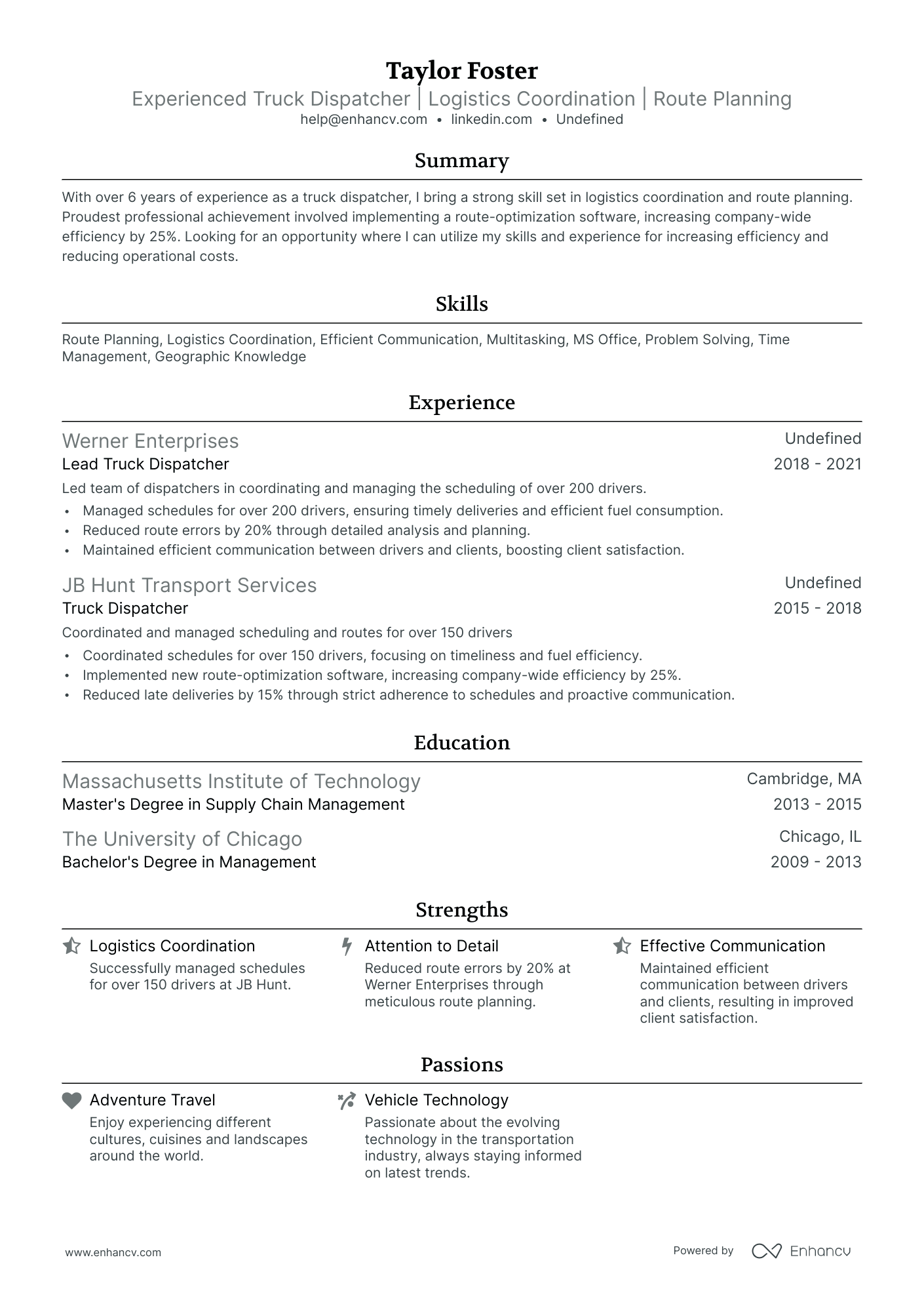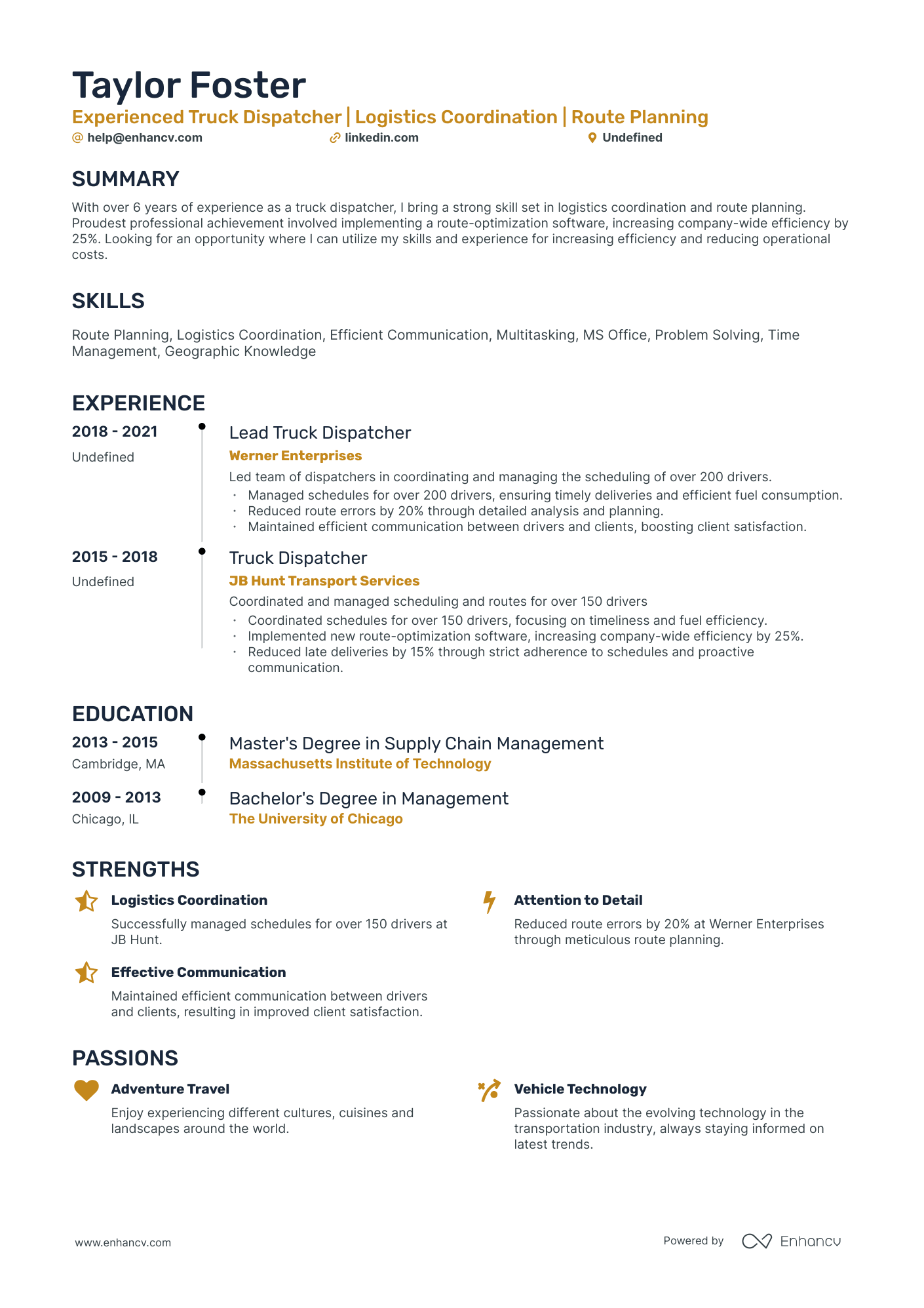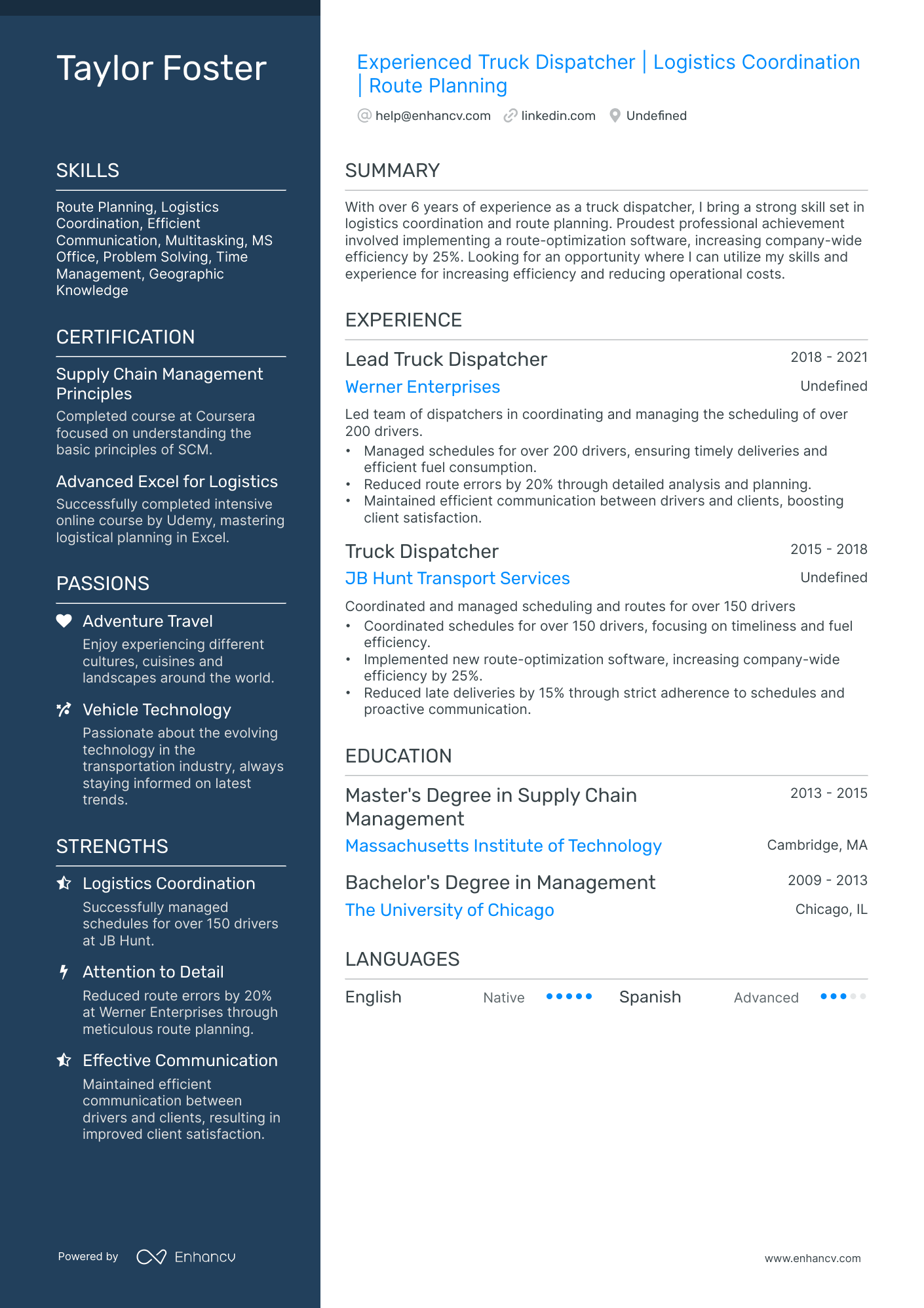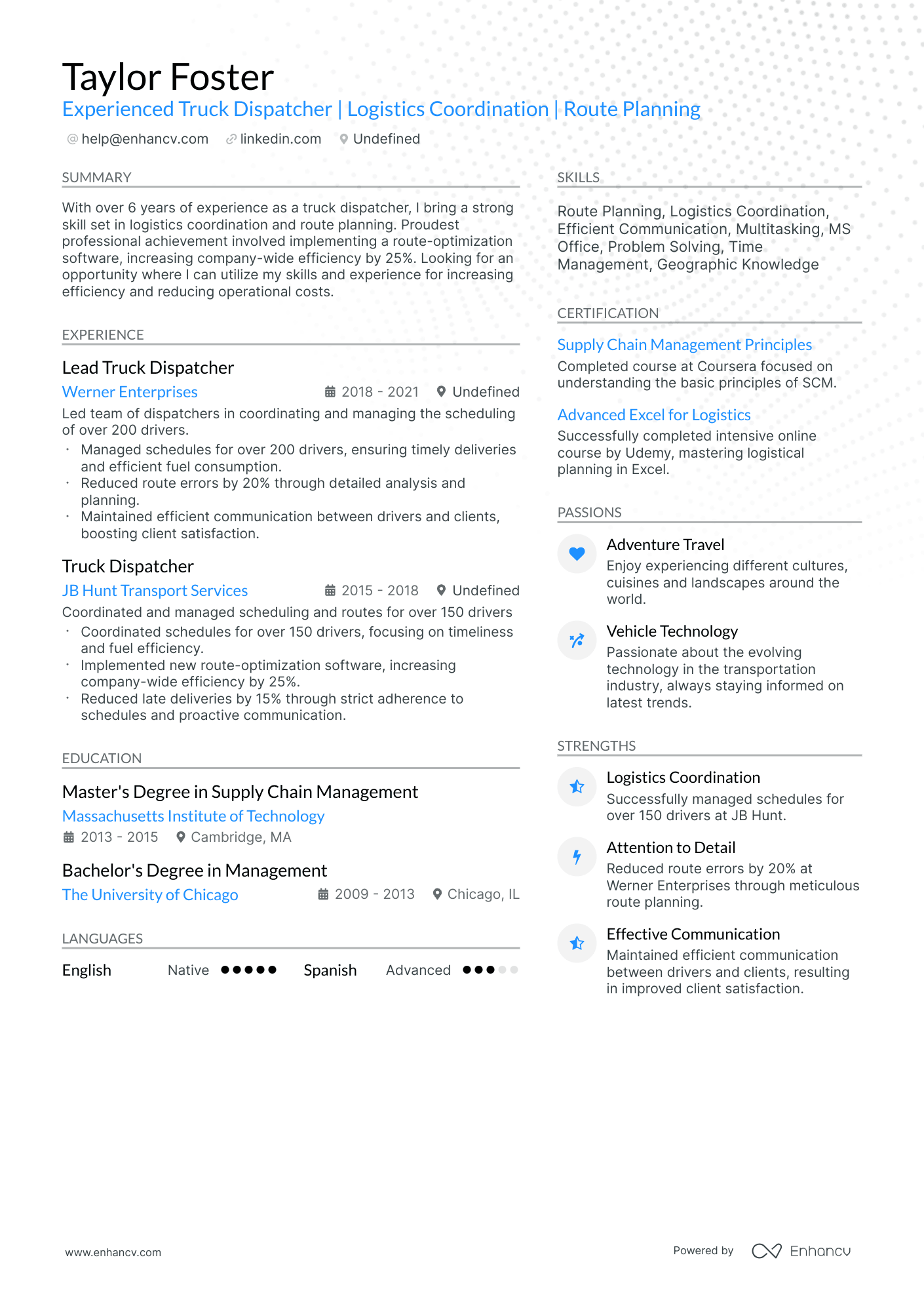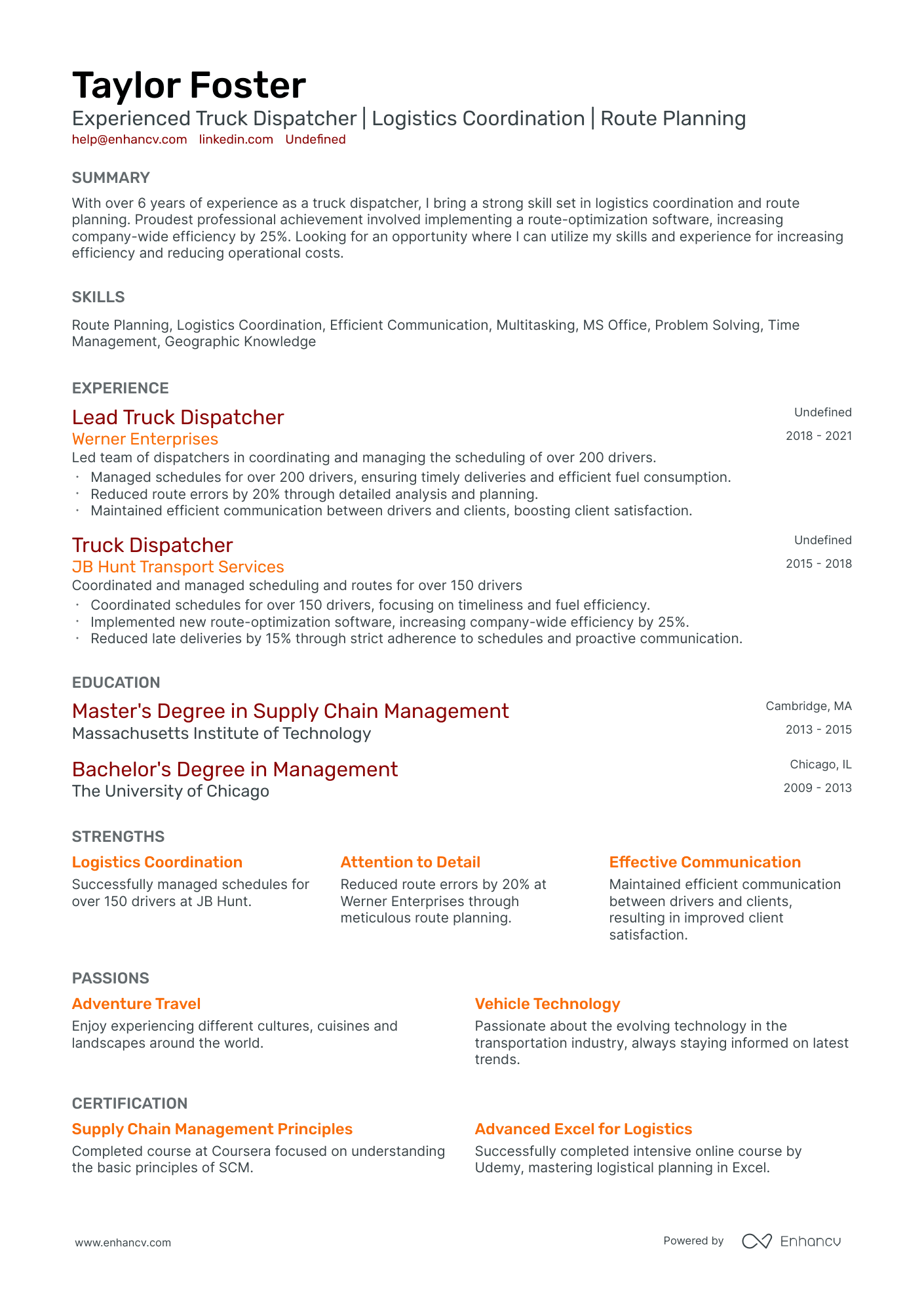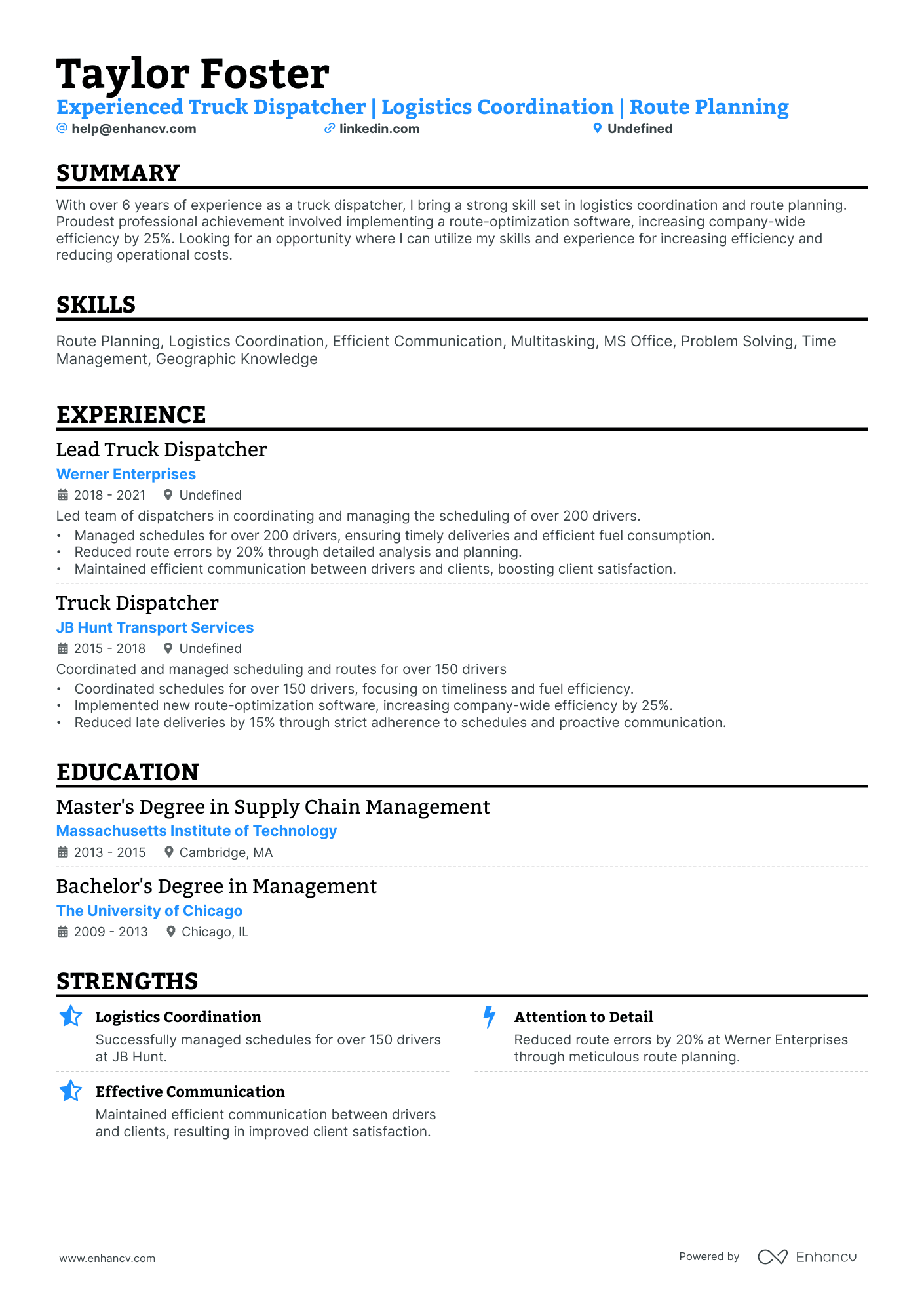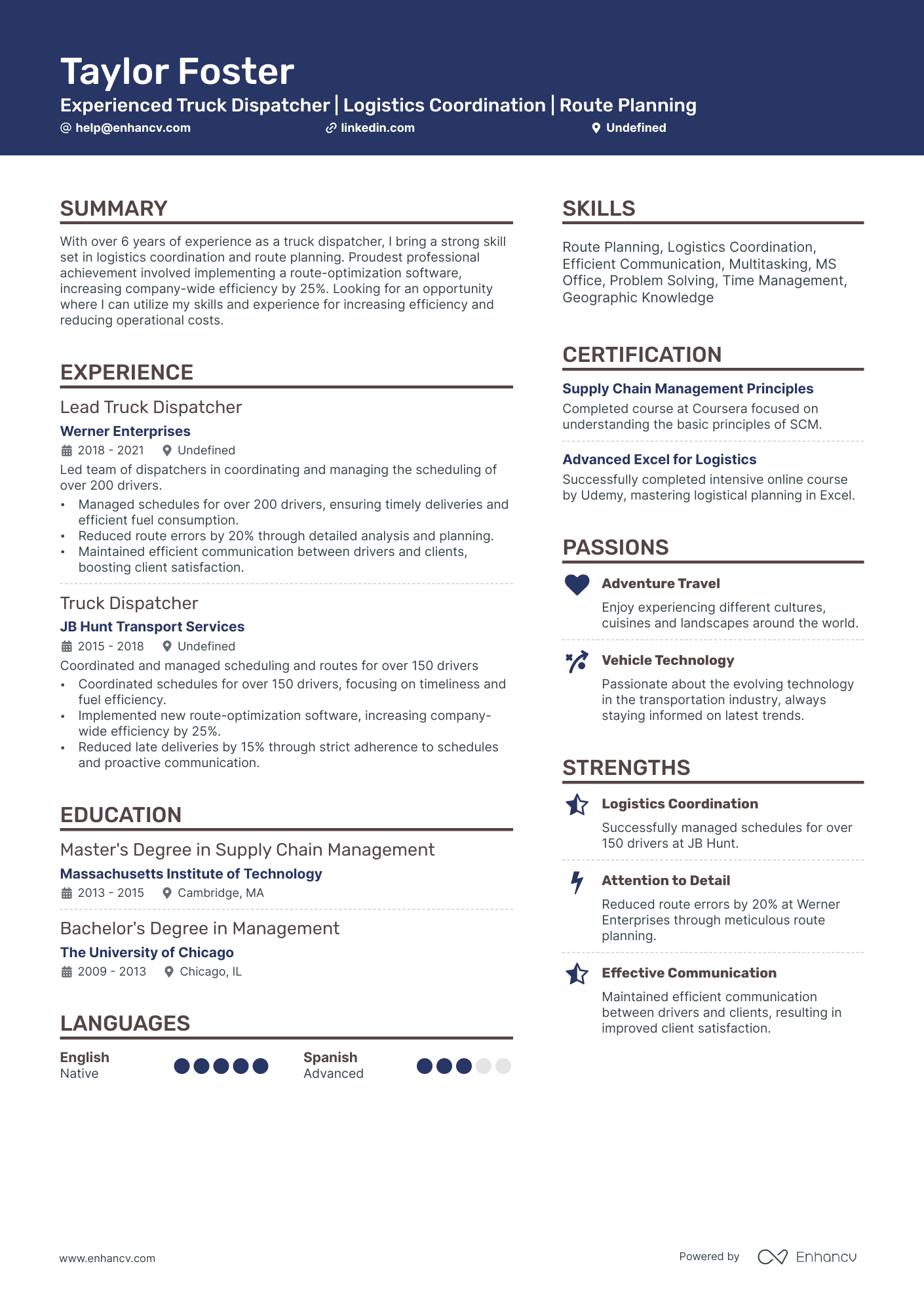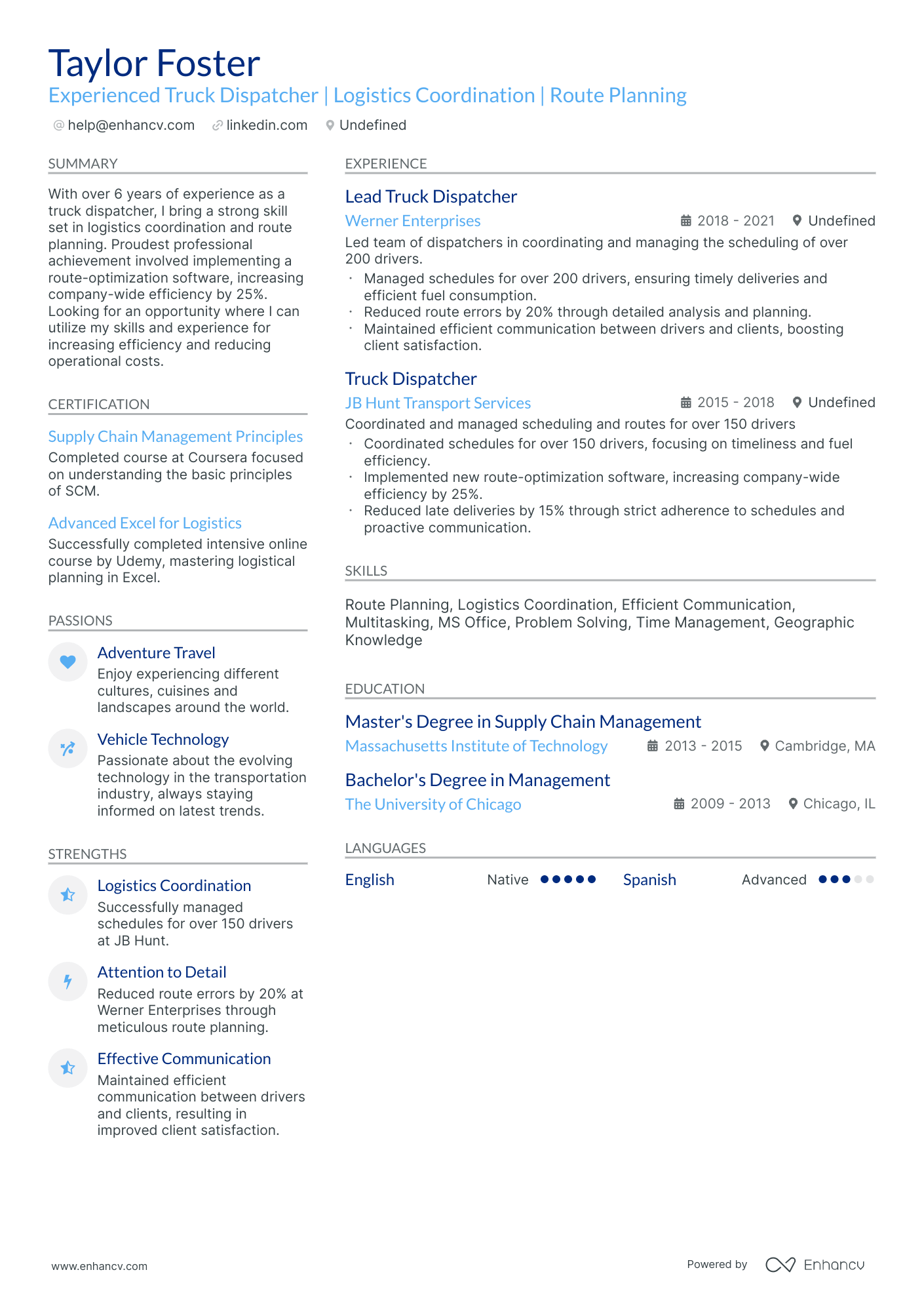A specific resume challenge faced by a truck dispatcher may be articulating the complexity of their role, which includes managing logistics, ensuring safety regulations are followed, and handling emergency situations. Our guide can assist in addressing this challenge by providing industry-specific language and action verbs to effectively communicate these responsibilities, as well as examples on how to quantify achievements and demonstrate problem-solving skills.
Dive into our concise guide to learn how to:
- Show your truck dispatcher career's brightest moments through your resume's summary, objective, and experience sections.
- Explore top-notch truck dispatcher resume examples to understand how to distinguish yourself from other candidates.
- Identify the most sought-after truck dispatcher skills and certifications in the industry.
- Design a structured yet unique resume layout.
Recommended reads:
Styling your truck dispatcher resume: layout and format
Pondering the ideal length for your truck dispatcher resume? Experts suggest keeping it between one and two pages. Opt for the two-page format if you boast over a decade of pertinent experience. Moreover, the resume format you choose is pivotal in showcasing your experience. Consider the:
- Reverse-chronological resume format to spotlight your career journey;
- Functional skill-based resume format if you're light on experience but want to emphasize skills;
- Hybrid resume format to provide recruiters a comprehensive view of both your experience and skills.
Here are some additional tips for your truck dispatcher resume layout:
- Keep your headline straightforward: mention the job you're targeting, a notable certification abbreviation, or your professional specialty;
- Always customize your truck dispatcher resume for the specific role, aligning job requirements with your experience in various resume sections;
- After finalizing your resume, save it as a PDF (unless instructed otherwise) to maintain its readability and layout consistency.
Upload your resume
Drop your resume here or choose a file. PDF & DOCX only. Max 2MB file size.
Pro tip
Consider incorporating design elements like icons or charts to enhance your resume's visual appeal and readability. But remember, the key is subtlety; don't let design overshadow content.
The five (plus) definite sections your resume for a truck dispatcher job should include are:
- Header with your headline, contact details, and/or a preview of your work
- Summary (or objective) to pinpoint how your success aligns with the role
- Experience with bullets of your most relevant achievements in the field
- Skills to integrate vital job requirements (both technical and personal)
- Your further dedication to the field, showcased via relevant higher education and/or certifications
What recruiters want to see on your resume:
- Experience with dispatching software: Familiarity with tools such as Fleetmatics, Towbook, or similar can significantly enhance the dispatcher's efficiency.
- Knowledge of DOT regulations: This ensures compliance with rules for hours of service, truck weights, and other logistics-related laws.
- Customer service skills: Ability to provide excellent service to clients, handle complaints professionally, and ensure customer satisfaction.
- Problem-solving skills: Critical thinking is key to resolving unexpected issues like vehicle breakdowns, schedule changes, or route adjustments.
- Organizational skills: The ability to manage multiple tasks, keep track of various drivers and shipments, and maintain accurate records.
Recommended reads:
Detailing your relevant experience on your truck dispatcher resume
Showcase your credibility in the resume experience section. For an effective truck dispatcher resume:
- Highlight measurable achievements.
- Scan the job advert for keywords and integrate them throughout your experience section.
- Emphasize your technical proficiencies and how you've applied them in various roles.
- Keep it simple: mention your responsibility, relevant skills, and the outcomes.
- Use this section to convey your unique value, soft skills, feedback received, and the type of company culture you thrive in.
Top professionals ensure their experience section offers a captivating look at their expertise. Check out our sample truck dispatcher resumes for guidance.
- Coordinated the dispatching of trucks, ensuring timely delivery of goods to clients.
- Optimized routes and schedules, resulting in a 15% reduction in fuel consumption.
- Managed a fleet of 20 trucks, effectively assigning drivers to maximize productivity.
- Implemented a real-time tracking system, improving communication between drivers and customers.
- Collaborated with warehouse staff to streamline loading and unloading processes.
- Dispatched trucks for time-sensitive deliveries, meeting strict deadlines consistently.
- Negotiated contracts with carriers, reducing transportation costs by 10% annually.
- Developed strong relationships with drivers, fostering a positive work environment.
- Implemented an automated routing system, optimizing efficiency and reducing transit times.
- Served as the main point of contact for customer inquiries, resolving issues promptly.
- Supervised a team of dispatchers, providing guidance and support for daily operations.
- Developed and implemented training programs to enhance dispatcher skills and efficiency.
- Collaborated with sales team to identify new business opportunities and expand client base.
- Created and maintained accurate records of all dispatched shipments and related documentation.
- Participated in regular safety audits, ensuring compliance with industry regulations.
- Coordinated dispatch operations for a specialized fleet of oversized and overweight shipments.
- Managed logistics for high-profile projects, including coordinating with local authorities and obtaining necessary permits.
- Implemented a risk management system, reducing incidents and ensuring the safe transportation of goods.
- Developed customized routing strategies to optimize delivery schedules and minimize costs.
- Collaborated with clients to understand their unique requirements and provide tailored solutions.
- Utilize advanced telematics systems to track and monitor truck movements in real-time.
- Optimize resource allocation by analyzing data and making informed decisions.
- Coordinate with drivers and maintenance teams to ensure timely vehicle servicing and repairs.
- Implement digital communication channels to enhance information flow between stakeholders.
- Conduct regular performance evaluations to identify areas for improvement and provide constructive feedback.
- Managed a team of dispatchers, assigning tasks and monitoring their performance.
- Implemented a GPS tracking system, improving route efficiency and reducing delivery times by 10%.
- Negotiated contracts with carriers, resulting in a cost savings of $100,000 annually.
- Collaborated with warehouse staff to streamline loading processes, reducing loading times by 20%.
- Resolved customer complaints and issues promptly, ensuring high levels of customer satisfaction.
- Created and maintained a comprehensive database of carrier and driver information.
- Developed and implemented standard operating procedures for dispatch operations.
- Coordinated with vendors to ensure the availability of necessary equipment and supplies.
- Managed dispatch priorities during peak seasons, ensuring on-time deliveries for all customers.
- Conducted regular performance reviews and provided training to improve dispatcher efficiency.
- Monitored and tracked truck movements using radio communications and digital tracking systems.
- Scheduled and dispatched trucks for both local and long-haul shipments.
- Collaborated with drivers to troubleshoot issues and provide timely solutions.
- Maintained accurate records of all dispatched shipments and updated delivery status in the system.
- Assisted in load planning and coordination to optimize truck capacity and minimize costs.
- Implemented a new dispatch software system, improving operational efficiency by 20%.
- Utilized data analytics to identify trends and optimize dispatching strategies.
- Collaborated with maintenance teams to ensure fleet readiness and minimize downtime.
- Managed customer relationships, addressing concerns and providing proactive updates.
- Coordinated with brokers and carriers to secure capacity and negotiate competitive rates.
- Coordinated the dispatch of temperature-controlled trucks, ensuring product integrity throughout the journey.
- Developed and implemented a driver training program, resulting in a 30% reduction in accidents.
- Managed daily scheduling and routing adjustments to accommodate changing customer demands.
- Collaborated with shippers and receivers to resolve any issues or delays during transit.
- Implemented a digital load board system, optimizing the matching of available loads with drivers.
The following content includes information from "O*NET OnLine" by the U.S. Department of Labor, Employment and Training Administration (USDOL/ETA). Used under the CC BY 4.0 license. The data represents the top responsibilities present on the task lists for truck dispatcher professionals.
Top Responsibilities for Truck Dispatcher:
- Schedule or dispatch workers, work crews, equipment, or service vehicles to appropriate locations, according to customer requests, specifications, or needs, using radios or telephones.
- Prepare daily work and run schedules.
- Confer with customers or supervising personnel to address questions, problems, or requests for service or equipment.
- Relay work orders, messages, or information to or from work crews, supervisors, or field inspectors, using telephones or two-way radios.
- Receive or prepare work orders.
- Record and maintain files or records of customer requests, work or services performed, charges, expenses, inventory, or other dispatch information.
- Arrange for necessary repairs to restore service and schedules.
- Monitor personnel or equipment locations and utilization to coordinate service and schedules.
- Determine types or amounts of equipment, vehicles, materials, or personnel required, according to work orders or specifications.
- Advise personnel about traffic problems, such as construction areas, accidents, congestion, weather conditions, or other hazards.
Quantifying impact on your resume
<ul>
Tips for truck dispatcher newcomers launching their careers
Lacking extensive experience for that truck dispatcher role? No worries.
Sometimes, hiring managers go for the unexpected candidate when they see potential.
Here's how to convince them you're the right fit:
- Opt for the functional skill-based or hybrid formats to highlight your unique professional value.
- Always tailor your truck dispatcher resume to emphasize the most critical requirements, usually listed at the top of the job ad.
- Compensate for limited experience with other relevant sections like achievements, projects, and research.
- In your truck dispatcher resume objective, pinpoint both your achievements and how you envision your role in the position.
Recommended reads:
Pro tip
When detailing your career journey, there's no need to delve deep into early roles. Prioritize what resonates with recruiters. For senior positions, a decade-long retrospective can effectively illustrate your evolution.
Highlighting essential hard and soft skills for your truck dispatcher resume
Your skill set is a cornerstone of your truck dispatcher resume.
Recruiters keenly evaluate:
- Your hard skills, gauging your proficiency with specific tools and technologies.
- Your soft skills, assessing your interpersonal abilities and adaptability.
A well-rounded candidate showcases a harmonious blend of both hard and soft skills, especially in a dedicated skills section.
When crafting your truck dispatcher skills section:
- List up to six skills that resonate with the job requirements and highlight your expertise.
- Feature a soft skill that encapsulates your professional persona, drawing from past feedback or personal reflections.
- Consider organizing your skills into distinct categories, such as "Technical Skills" or "Soft Skills."
- If you possess pivotal industry certifications, spotlight them within this section.
Crafting a comprehensive skills section can be daunting. To assist, we've curated lists of both hard and soft skills to streamline your resume-building process.
Top skills for your truck dispatcher resume:
Logistics Management Software
GPS Tracking Systems
Fleet Management Software
Communication Tools (e.g., Two-way Radios, Mobile Apps)
Routing Software
Customer Relationship Management (CRM) Systems
Electronic Logging Devices (ELDs)
Load Boards
Spreadsheet Software (e.g., Microsoft Excel)
Database Management Systems
Communication Skills
Problem-Solving
Time Management
Attention to Detail
Multitasking
Teamwork
Adaptability
Stress Management
Negotiation Skills
Customer Service Orientation
Next, you will find information on the top technologies for truck dispatcher professonals from "O*NET OnLine" by the U.S. Department of Labor, Employment and Training Administration (USDOL/ETA). Used under the CC BY 4.0 license.
Top technologies for Truck Dispatcher’s resume:
- Microsoft Dynamics
- SAP software
- Microsoft PowerPoint
- Global positioning system GPS software
- Situation resource tracking software
Pro tip
When detailing your skills, align them with the job's requirements. Emphasize unique technical proficiencies and provide examples of your soft skills in action.
Highlighting education and certification on your truck dispatcher resume
Your education section is a testament to your foundational knowledge and expertise.
Consider:
- Detailing your academic qualifications, including the institution and duration.
- If you're still studying, mention your anticipated graduation date.
- Omit degrees that aren't pertinent to the job.
- Highlight academic experiences that underscore significant milestones.
For truck dispatcher roles, relevant education and certifications can set you apart.
To effectively showcase your qualifications:
- List all pertinent degrees and certifications in line with the job requirements.
- Include additional certifications if they bolster your application.
- Provide concise details: certification name, institution, and dates.
- If you're pursuing a relevant certification, indicate your expected completion date.
Your education and certification sections validate both your foundational and advanced knowledge in the industry.
Best certifications to list on your resume
- Certified in Logistics, Transportation and Distribution (CLTD) - APICS
- Freight Broker Training Certification - Brooke Training
Pro tip
If you're in the process of obtaining a certification listed in the job requirements but haven't completed it yet, be transparent. Mention your ongoing training and the expected completion date. Honesty is always the best policy on a resume.
Recommended reads:
Choosing between a resume summary or objective
Many truck dispatcher candidates ponder whether to include a resume summary or objective.
Here's a breakdown:
- A Resume objective outlines your career aspirations. It tells recruiters why you're applying and the value you can bring.
- A Resume summary offers a snapshot of your significant achievements, giving a quick overview of your expertise.
New professionals might lean towards an objective, while seasoned experts might prefer a summary. Whichever you choose, ensure it's tailored to the role.
For inspiration, review examples from established truck dispatcher professionals.
Resume summary and objective examples for a truck dispatcher resume
- A seasoned dispatcher with over 10 years of experience in logistics management and supply chain operations. Excellent communication skills, adept at managing complex delivery schedules and optimizing routes for maximum efficiency. Successfully introduced a streamlined dispatch system that saved the company $500K annually.
- Highly organized professional with a decade's experience coordinating logistical operations in a high-volume warehouse environment. Expertise in leveraging advanced route planning software to improve on-time deliveries by 30%. Recognized with an 'Employee of the Year' award for implementing effective cost-saving strategies.
- Motivated project manager transitioning into truck dispatching. Proven ability to manage multiple tasks simultaneously, excelling in fast-paced environments. Brings 8 years of team leadership coupled with exceptional problem-solving abilities. Holds a record of enhancing operational efficiency by 35% in previous roles.
- Sales executive eager to transfer seven years of customer service and vendor management skills into a truck dispatcher role. Proficient in forecasting, data analysis, and budget management. Recipient of 'Salesperson of the Year' award thrice for surpassing sales objectives by an average of 12%.
- Recent graduate seeking entry-level position in truck dispatching. Eager to apply knowledge from Bachelor's degree in Supply Chain Management to optimize delivery schedules. Proficient in MS Office Suite, holds excellent problem-solving abilities, and is committed to ensuring on-time deliveries.
- Enthusiastic individual pursuing a career as a truck dispatcher. Armed with a diploma in Logistics and Transport Management and excellent organizational skills. Adept at multitasking with keen attention to detail, aiming to leverage these skills to enhance operational efficiency.
Additional sections to amplify your truck dispatcher resume
To further personalize your resume and showcase a broader spectrum of your professional journey, consider adding:
- Projects that highlight your hands-on experience.
- Awards that recognize your industry contributions.
- Volunteer work that underscores your community involvement and soft skills.
- Hobbies that offer a glimpse into your personality and passions.
Key takeaways
- Keep your truck dispatcher resume clear and organized with key sections.
- Only include relevant details. Space is limited.
- Support your achievements with both hard and soft skills.
- Detail your experience, focusing on your industry expertise.
- Highlight the most relevant certifications to show your dedication to the field.
